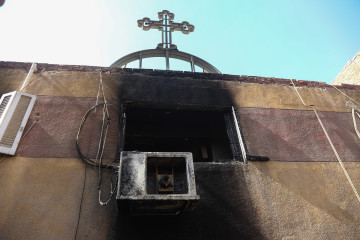

The series of church fires erupting in Egypt in a matter of eight days brought to the surface the restrictions imposed on Christians to have equal rights with the Muslim majority and build new worship premises flexibly.
On 14 August, a shocking incident took place when a major fire broke out in the Egyptian Abi Sefien Coptic church at Imbaba's working-class neighbourhood in Giza, west of the capital Cairo, claiming the lives of 41 people, including the priest and 15 children.
The church is a residential-styled building which had no emergency exits or any safety precautions. At the time of the incident, around 500 worshipers were inside, making it hard for the first responders to save the victims and the government was highly criticised for this for days following the incident.
The same scenario sadly played out in other churches not long after.
Even though the official narrative identified the causes of the blaze as short circuits and other unintentional reasons, The New Arab talked to a high-level source at the state security agents who confirmed otherwise.
Bishop Ermia, a member of the Holy Synod of the Coptic Orthodox Church, did not rule out foul play either, in contrast to the authorities' official story.
"[The fires at churches] occurred systematically…. this is an alarm to the state. We need to join forces to be able to surpass this crisis. I don't talk about the economic crisis and the rising prices. We all suffer in this world," he said during a sermon.
"But when the country loses its lovers and those who backed it [the Copts], this is a dangerous start of further hazardous issues. This must be stopped. This should be investigated.
"What I worry about…is the timings when these incidents take place," the bishop added.
The percentage of Christians in Muslim-majority Egypt has never been officially released. But it is believed they make up approximately 10 to 15 percent of the 103 million population; most of them are Coptic Orthodox and are among the world's oldest Christian communities.
Law under fire
Building a church or even renovating a bathroom inside one has always been faced with many obstacles.
A long-awaiting church construction law no. 80 for 2016 was approved by the parliament on 30 August 2016 and ratified by Egyptian President Abdel-Fattah al-Sisi on 28 September the same year.
The law was hailed by local media, loyal to the regime, in a bid to imply that Copts have finally gained a considerable part of their rights.
However, the legislation was slammed by a high percentage of Christians and rights groups alike.
The legislation called off a previous requirement that the president must approve o construction of all new churches, making that instead the responsibility of governors.
“But the law allows the governors of each province to deny church-construction permits with no chance of appeal. It further requires that churches be built in proportion with the number of Christians in the area,” a Coptic activist told The New Arab on condition of anonymity.
“This led many Christians to build unlicensed churches or build a multi-storey church to accommodate the number of worshipers with no safety measures, which was the main cause of the deaths and injuries at the Imbaba incident,” the activist added.
Moreover, Egyptian Christians have been going through an endless dilemma as to inheritance. Islamic inheritance laws are imposed on Christians against their belief. Women have fought endlessly for their right to have equal shares of inheritance with men but in vain.
“My parental aunt was very sick for years and I and my sister and were the ones taking care of her. When she passed away, our cousin, her parental nephew, inherited all her possessions as per the Islamic Sharia, even though he wouldn’t care to check on her during her lifetime. Is that fair?” one Christian lady wondered.
“Copts are threatened by many factors including discrimination in many aspects, lack of safety and security and sharia imposed on them in many situations in addition to racism and violence,” the Coptic researcher argued.
Sectarian violence continues
Even though Sisi pledged to respect freedom of belief and made key visits to Coptic Christmas masses, the authorities have always failed to protect Christians from violent attacks, racism and discrimination.
“Aggression against Christians occurs till the present day, especially in the south, which is mostly covered up by the authorities,” a Cairo church priest, who declined to be named, told The New Arab.
“Many Coptic girls were abducted by extremists to force them to convert to Islam or rape them, then the security forces return the girls to their families without investigating these cases, leaving perpetrators to get away with their deeds,” he added bitterly.
The New Arab reached out to some Christian but they declined to talk even anonymously.
People rarely hear about any of these incidents unless social media spotlights them. Mostly such cases are presented during public reconciliation sessions with the Muslims, enforced on the Christians and sponsored by the authorities, according to the priest.
On other occasions, Christians find themselves obligated to run for their lives. In 2017, for example, almost 140 Coptic Christian families fled the city of Arish, the capital of North Sinai following threats of death by the Islamic State local branch, after some had already been killed.
“We are being dealt with as second-class citizens even if the government denies this. But it’s a fact that we all know. And the Pope has always played it safe with the regime,” the priest concluded.





 Follow the Middle East's top stories in English at The New Arab on Google News
Follow the Middle East's top stories in English at The New Arab on Google News


